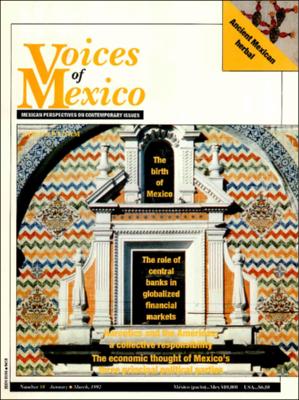Mostrar el registro sencillo del ítem
Voices of Mexico: Mexican Perspectives on Contemporary Issues
| dc.rights.license | http://ru.micisan.unam.mx/page/terminos | |
| dc.contributor.editor | Toro Gayol, Marybel | |
| dc.contributor.other | Velasco Montante, Astrid | |
| dc.date.accessioned | 2019-01-17T18:07:23Z | |
| dc.date.accessioned | 2022-02-17T00:15:31Z | |
| dc.date.available | 2019-01-17T18:07:23Z | |
| dc.date.available | 2022-02-17T00:15:31Z | |
| dc.date.issued | 1992 | |
| dc.identifier.issn | 0186-9418 | |
| dc.identifier.uri | https://ru.micisan.unam.mx/handle/123456789/21916 | |
| dc.format | application/pdf | |
| dc.format.extent | 109 pp. | |
| dc.language.iso | eng | |
| dc.publisher | Universidad Nacional Autónoma de México, Coordinación de Humanidades, Centro de Investigaciones sobre Estados Unidos de América | |
| dc.relation.isformatof | ||
| dc.relation.haspart | Our Voice / Margáin, Hugo B.; Report of the Inter-American Comission on Drug Policy /; Mexico"s Anti-Drug Policies / Moguel Flores, Eduardo Héctor; Drugs and Social Compelxity: Constants of the Past and Present / Núñez García, Silvia; Puebla, History and Sights / Henestrosa, Andrés; The Birth of Mexico / Lomnitz, Cinna; Earthquakes in The Valley of Mexico / Bernal Sahagún, Víctor M.; The Two Faces of Free Trade / Vargas Suárez, Rosío; Mexico"s (Black) Golden Egg /; Winners and Losers: Readjustment Mechanisms in an NAFTA / Ruiz Massieu, José Francisco; Mexico"s Political Assets / Bonfil Batalla, Guillermo; The FTA’s cultural dimension / Giscard D"Estaing, Valery; The Role of Central Banks in Globalized Financial Markets /; The Economic Thought of Mexico"s Three Principal Political Parties / Cruz González Franco, Lourdes; The Amparo Museum, Puebla / Álvarez del Castillo, Fernando; Music in the Cathedral (1531-1664) / Barrientos, Juan José; Christopher Colombus" Raincoat / Ortega, Miguel A.; The First Ibero-American Summit Meeting: Results and Perspectives /; Latin America"s First Free Trade Agreement / Martínez Zwanzinger, Celia; First Latin American to Win the New York City Marathon / Villanueva, Raquel; The Utopian Guillermo Bonfil Batalla / Güemes, Lina Odena; Eli de Gortari, Ana Mérida, and Alfonso García Robles / Montiel Ziegler, Elsie; The Last Days Of Camelot / García Terrés, Jaime; Mictlantecuhtli, Lord of the Dead / Barjau, Luis; Ceja Tenorio, José Fausto; Codex Cruz-Badiano: The Magic of the Ancient Mexican Herbal / Salinas de Gortari, Carlos; The Hidden Night / Molina, Mauricio; Interview: Toni Kuhn, Cameraman for the film La Tarea / Isaak, Dinorah | |
| dc.relation.requires | Adobe Acrobat | |
| dc.subject | HUMANIDADES Y CIENCIAS DE LA CONDUCTA | |
| dc.title | Voices of Mexico: Mexican Perspectives on Contemporary Issues | |
| dc.audience | Estudiantes | |
| dc.audience | Maestros | |
| dc.audience | Investigadores | |
| dc.audience | Otros públicos | |
| dc.audience | Medios de comunicación | |
| dc.contributor.assistanteditor | Montiel Ziegler, Elsie | |
| dc.contributor.assistanteditor | García Chávez, Alonso | |
| dc.contributor.businessmanager | Ocampo, Consuelo | |
| dc.contributor.corrector | Weissman, Mischa | |
| dc.contributor.designer | Noriega, Ricardo | |
| dc.contributor.designer | Belmar, Marco Antonio | |
| dc.contributor.editorinchief | Margáin, Hugo B. | |
| dc.contributor.layout | Glypho, Taller de Gráfica | |
| dc.contributor.printer | Imprenta de Juan Pablos | |
| dc.contributor.salesandcirculationmanager | De Peeters, Olga | |
| dc.contributor.salesandcirculationmanager | Villanueva, Raquel | |
| dc.contributor.salesandcirculationmanager | Flores, Bety | |
| dc.contributor.translator | Jinks, Pauline | |
| dc.contributor.translator | Marmasse, Lucienne | |
| dc.contributor.translator | Stephens Suzanne | |
| dc.contributor.translator | Caldera, Maurice | |
| dc.coverage.placeofpublication | México | |
| dc.date.printcopyrighted | [ca. 1992] | |
| dc.description.extract | In a world in which an increasingly active interrelationship is now the trend, and the exhange of ideas is fundamental, Voices of Mexico has been known in the United States for the last five years to have been doing very worthwhile work under the directorship of Mariclaire Acosta. Voices of Mexico will continue to be published; the University authorities having decided to restructure it and to incorporate it with the The Center for Research on the United States. It will, therefore, go on providing the north of our continent with Mexican views on present international events, starting with this issue -No. 17- covering the last quarter of 1991. The majority of our northern neighbors know little about what Mexico is really like. The same is true here; Mexicans are often unaware of what people in the north are thinking. Because of this lack of knowledge, unnecessary problems arise -problems that would be avoidable if only we knew each other better. However, this is no easy task: Mexico is the vanguard of the Latin nations of this hemisphere, bordering as it does on the Anglo-Saxon lands tothe north. Social, cultural, political and economic differences make for difficult and complicated dialogue, which would be easier if there were a mutual effort to get to know the different situations in the three countries of North America. This is even more urgent now because of the Free Trade Agreement that is being negotiated. The aim of this magazine is to open more and more space for understanding based on objective knowledge -the source of mutual respect- which is essential if we wish to live together in harmony and justice. The differences between the three countries are deep-rooted: up north the Anglo-Saxon and French cultures predominate, whereas here we have an Indian-Spanish one. The language is different and sometimes the ideals too. The United States is now taking on an increasingly dominant worldwide role, as it no longer has to share it with the Sovietnion. From being bipolar, after the Second World War, the world is now, as we near the end of the century, becoming unipolar and the "Cold War" is becoming a thing of the past. Mexico"s position is different. Our attention is concentrated on solving social problems that have so far proved to be extremeiy difficult to eradicate. We are overwhelmed by mass poverty. The redistribution of wealth aims to achieve a fairer society, by narrowing the immense gap between rich and poor. There is a big difference between our northern neighbors"economic development and that of Mexico. The United States is the richest power in the world Canada too is a rich country, while we are still in the first, difficult stages of progress. There is enormous asymmetry in the economic field In spite of the differences, we can and must live together in peace and hannony working out our common problems by dint of reason. The rules of thought are common to all of us. We are all subject to logic. The Free Trade Agreement between Canada, the United States and Mexico opens up a historie opportunity for us, if we know how to negotiate it for our mutual benefit in all the different branches of the economy. The progress brought about by the enormous regional market -although all of us will have a share in it-.will raise Mexico"s standards of living. It has always been said that there is no progress without social justice, and social problems cannot be adílressed without the resources stemming from development. In this issue several articles by well-known specialists comment on the regionalization of the northern part of this continent. Mexico"s contribution to world culture is extraordinary. The most outstanding Indian civilizations, with the exception of the Incas in the south, all developed here in Mesoamerica. During colonial times, New Spain left its permanent stamp of European culture enriched by its obvious syncretism with the native Indian civilization. Modern Mexico is outstanding for its murals, its music, its architecture and its literature, to mention but four branches of culture. Our University is a prominent example of modern Mexican architecture. Our literature received international recognition when Octavio Paz was awarded the Nobel Prize. Several years earlier, Alfonso García Robles had received the Nobel Peace Prize for his untiring work to bring about the signing of the Tlatelolco Treaty, by which nuclear weapons were outlawed in Latin America, but nuclear energy was allowed to be used for peaceful purposes. The Treaty proposed an exemplary change: atonzic energy, instead ofbeing used to kill and destroy, should be used for construction and progress. An energy that is unsurpassed up to now, the energy "the suns feed on", harnessed in the service of progress and peace. Every issue of the magazine will present a sample of Mexico"s past and present cultural riches. Our task is to bring the voice of Mexico to the northern pan of the continent, convinced as we are of the need to avoid disagreements arising from the lack of objective knowledge about what we really are. Let us make reason and dialogue our common strong points | |
| dc.discipline.clase | Multidisciplina | |
| dc.educationlevel | Medio superior | |
| dc.educationlevel | Superior | |
| dc.educationlevel | Posgrado | |
| dc.identifier.cisan | VOM_1992_0018 | |
| dc.identifier.conacyt | CONACYT | |
| dc.relation.issued | 18, January-March, 1992 | |
| dc.rights.accesslevel | openAccess | |
| dc.rights.creativecommons | http://creativecommons.org/licenses/by-nc-nd/4.0 | |
| dc.subject.conacyt | 4 | |
| dc.type.spa | other | |
| dc.view.accesslevel | DISPONIBLE |
Ficheros en el ítem
Este ítem aparece en la(s) siguiente(s) colección(ones)
-
Números completos [125]
MiCISAN, Repositorio Institucional
Hecho en México, todos los derechos reservados 2018. Esta página puede ser reproducida con fines no lucrativos, siempre y cuando no se mutile, se cite la fuente completa y su dirección electrónica. De otra forma, requiere permiso previo por escrito de la institución.
Sitio Web administrado por: Centro de Investigaciones sobre América del Norte • micisan@unam.mx








